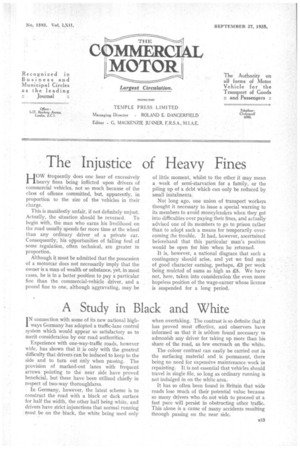The• Injustice of Heavy Fines
Page 23

If you've noticed an error in this article please click here to report it so we can fix it.
HOW frequently does one hear of excessively 'heavy fines being inflicted upon drivers of commercial vehicles, not so much because of the class of offence committed, but, apparently, in proportion to the size of the vehicles in their charge.
This is manifestly unfair, if not definitely unjust.
Actually, the situation should be reversed. To begin with, the man who earns his livelihood on the road usually spends far more time at the wheel than any ordinary driver of a private car. Consequently, his opportunities of falling foul of some regulation, often technical, are greater in proportion.
Although it must be admitted that the possession of a motorcar does not necessarily imply that the owner is a man of wealth or substance, yet, in most cases, he is in a better position to pay a particular fine than the commercial-vehicle driver, and a pound fine to one, although aggravating, may be of little moment, whilst to the other it may mean a week of semi-starvation for a family, or the piling up of a debt which can only be reduced by small instalments.
Not long ago, one union of transport workers thought it necessary to issue a special warning to its members to avoid moneylenders when they got into difficulties over paying their fines, and actually advised one of its members to go to prison rather than to adopt such a means for temporarily overcoming the trouble. It had, however, ascertained beforehand that this particular man's position would be open for .him when he returned.
It is, however, a national disgrace that such a contingency should arise, and yet we find men of good character earning, perhaps, £3 per week being mulcted of sums as high as 25. We have not, here, taken into consideration the even more hopeless position of the wage-earner whose licence is suspended for a long period.




















































































